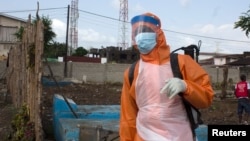Sierra Leone’s chief medical officer has said he is baffled by the deaths of three doctors from Ebola over a three-day period.
Dr. Brima Kargbo said a survey conducted jointly with the U.S. Centers for Disease Control (CDC) found that 70 percent of infections did not come from either the country’s Ebola holding centers or treatment facilities.
Kargbo said Dr. Aiah Solomon Konoyeima died Saturday, becoming the 10th Sierra Leonean physician to die of the virus.
He said Konoyeima was the third doctor to die from Ebola since Friday.
“We have Dr. Tom Rogers and Dr. [Dauda] Koroma, who were buried yesterday, and also Dr. Konoyeima,” Dr. Kargbo said.
Rogers was a surgeon at the Connaught Hospital, the main referral unit in the capital, Freetown. He was reportedly being treated at the British-run Kerry Town Ebola treatment center. He was said to be responding well to treatment when his condition deteriorated dramatically on Friday.
Koroma died at the Hastings Treatment Center, which is run entirely by local Sierra Leone medics.
Kargbo said it’s difficult for him to understand where the doctors got the disease.
“It interesting to note that a survey was conducted together with the CDC and it came up very clear that more 70 percent of our infections did not come from either our holding or treatment facilities,” he said.
Caregivers at risk
He said it is possible doctors became infected from patients they had been treating.
“Most definitely because, at the end of the day, if you follow the trend of the disease, the most affected persons are the health care workers and the caregivers or those who are taking care of persons with the virus,” Kargbo said.
Kargbo said compounding the problem is the fact that most of the people who come to the treatment centers do not tell the truth if they had been in contact with someone infected with Ebola.
Sierra Leone revealed last week that between 80 and 100 new cases of Ebola were being reported every day.
Kargbo said November saw the highest number of cases since the Ebola outbreak in May. But, he added, the numbers have begun to level off.
“Although we will not be able to say, ‘Yes, we are out of the woods’ yet, for the past three days, the figures are far lower than we saw in the month of November,” Kargbo said.
He said Sierra Leone is pleased with the international assistance it has been receiving, particularly from the African Union. But he said no amount of assistance will stop the infections if health workers do not adequately protect themselves.
“That is why, about three weeks ago, we had a symposium with the Sierra Leone Medical Association where we actually explained to them the reasons for them to fully protect themselves, even when examining your own father, your professional colleague, you need to be adequately protected for you not to be infected with the virus,” Kargbo said.





